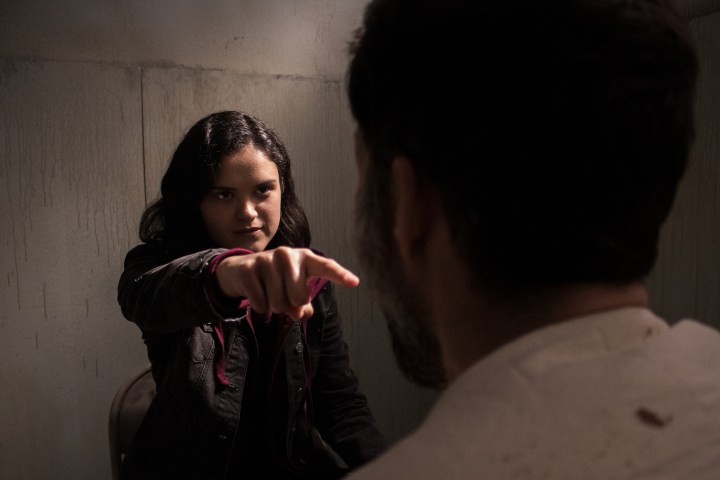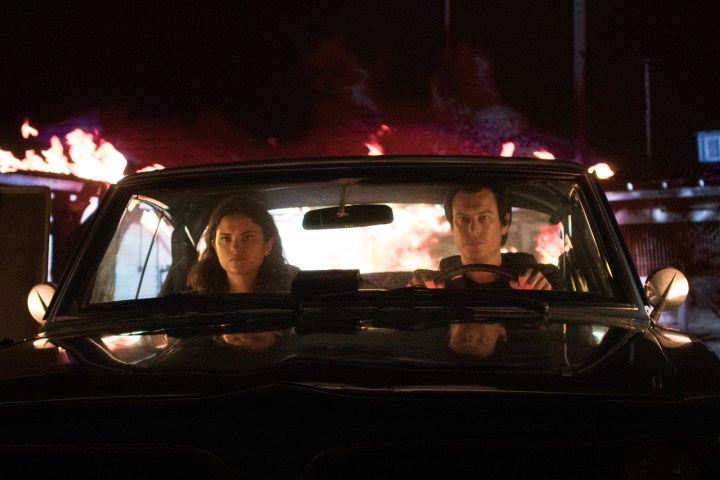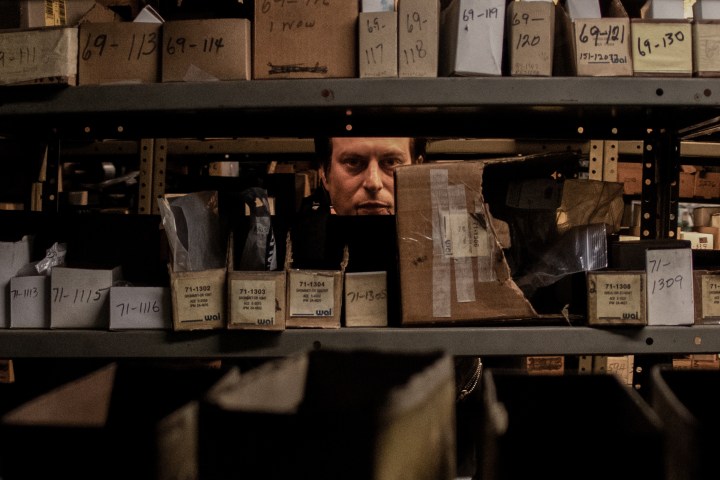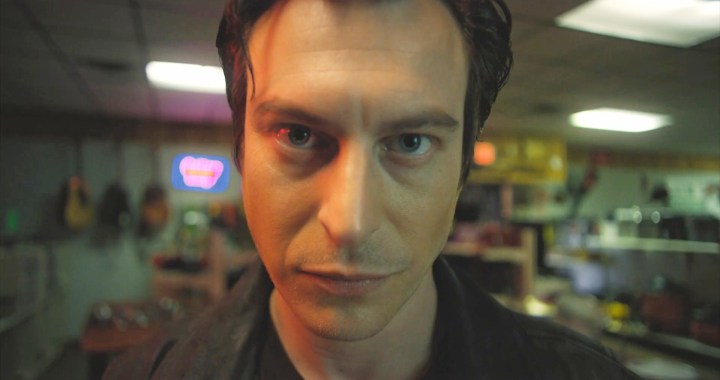It’s not too often you’ll find a relationship drama at the heart of a vampire movie, but that’s the case with Noah Segan’s directorial debut, Blood Relatives. Francis (Segan) is a 115-year-old Yiddish vampire who spends most of his time driving across America in the nighttime. One day, he meets Jane (Victoria Moroles), a rebellious teenage vampire that also happens to be his daughter. Left with no other choice, Francis takes Jane on a road trip as he grapples with the thought of becoming a dad to his long-lost daughter.
Blood Relatives has a surprising amount of heart for a film with protagonists that suck blood to survive. It combines the laughs of a buddy comedy with the emotions of a family drama to create a heartfelt story about fatherhood and acceptance. In an interview with Digital Trends, Segan and Moroles discuss how they formed a believable father-daughter relationship in such a short amount of time. Segan also explains how he incorporated his Judaism into the role, and Moroles talks about the appeal of relationship-driven stories.
Note: This interview has been edited for length and clarity.
Digital Trends: I was surprised by this movie. When I watch things at home, I try not to read a lot about the film and go in as blind as I can. I saw Blood Relatives as a vampire comedy, so I expected it to be a bloody little horror with two vampires trying to exist. But I found it to have a lot of heart. It’s a family drama about the challenges of being a father and forming a bond with a daughter. I stopped midway through the film and said, “Wait a minute. People are dying in this film, but this relationship is so charming that I don’t even care.”
Noah Segan: Thank you so much, man. It’s important to acknowledge we all make movies for ourselves. We make them for people to watch. Every movie does have a request from its audience, right? We’re always asking the people watching and giving us their time and their energy to meet us and let us take them on this journey.
Sometimes, we’re asking them to enjoy some blood and some guts or some adventure or sometimes even really hard traumatic stuff. And there is some of that in this movie, but I think the big ask that Blood Relatives has is it’s asking for a little bit of earnestness and sincerity. There are a lot of dad jokes. It sort of wears it on its sleeve, and that’s obviously a big ask for people. But, I appreciate you mentioning that because that’s exactly what we were going for.
Victoria Moroles: That makes me smile, hearing you say that. I love to hear people getting caught off guard. It’s definitely the intention. I thought it was different, too, whenever I first read it. I’ve always oddly wanted to do a parent-child, a father-daughter story so I thought this was a really cool different take on that. I’m a newbie to horror comedy, but we tried to make it as funny as possible. It’s definitely not meant to be taken seriously, that’s for sure.
Victoria, I tried to look up actors and actresses that have played a vampire and a werewolf. The list is pretty nonexistent, so you’re in rare company.
Moroles: Really? Ok, yeah! It’s definitely pretty strange, but I love it. [Laughs]
Which one’s lifestyle do you prefer?
Moroles: Oh man, don’t make me… I gotta say the vampire lifestyle is the way to go. Although they kind of mirror each other with their physical strength. I’ll say vampire because that was the one I did last.

Noah, take me through the thought process behind this film. What kind of movie were you trying to make?
Segan: Originally, the sort of impetus for the movie was just looking around my own life and realizing that after almost 20 years of going to film festivals and staying out all night and being a real cool guy, I wasn’t that cool. I was a dad. Of course, now I realize, “Hey, dads can be cool.” I had to write the script to come to that conclusion. When I formulated that concept, I was looking at the movies that were comforting to me in that respect, which were Paper Moon and Raising Arizona. Films that are very much about people reckoning with their parenthood.
Tonally, that became the drive. And then, I work on a lot of genre movies. I love horror films, and I thought that utilizing vampires was going to be the way that I was going to be able to tell this story in the most fun way. The kind of movie I wanted to watch, so to speak.
How did you find Victoria?
Segan: Victoria was introduced to me through our producer and actor and all-around partner, Josh Ruben, who had worked with her on Plan B. They have a scene in Plan B, Natalie Morales’s movie. Very early in the process, mid-pandemic, Josh, in his wisdom, said, “I’ve got to tell you. I’ve got to introduce you to this actor who I really believe is the right person for this gig.”
We met over the phone and Zoom. Nobody was meeting in person yet. I watched her film, and I was just so blown away by this person who not only is a great actor but obviously, so in tune with the vibe. She vibes so well. She is such a great hang. Oh, my gosh. To be able to have that energy propelling the film would be a dream come true. Luckily, sometimes dreams do come true.
What did you see in Jane that made you want to take on this role?
Moroles: Initially, I saw this sense of emotional maturity for her age. She’s going through a lot of loss and grief after just losing her mom. I saw this process that she was going through at the beginning with a sense of independence, which I really liked. I also saw the challenge of getting her from point A to point B. She’s isolated, [and] has a lot of walls up in the beginning, and then toward the end, she comes into her own and finds her place as a vampire in this family they’re trying to build together.
I looked at Plan B and Blood Relatives as an interesting double feature. On the surface, these are two separate topics, but they are both very relationship driven. Do you like these relationship-driven dramas?
Moroles: I appreciate you noticing that, and it would be a hilarious double feature. [Laughs] I definitely relate to character-driven, relationship-based stuff. I thought it was really funny how I went from one road trip, buddy comedy to another road trip movie. I think that was a funny coincidence.
I actually learned a lot of stuff on Plan B that I could bring to Blood Relatives, in terms of building and relying on people. Kuhoo and I had to rely on each other a lot. Noah and I had to rely on each other a lot. I love being able to show up and know that my goal was to connect with Noah. My main goal [on Plan B] was to connect with Kuhoo.
How did you build the father-daughter connection in such a short amount of time?
Segan: Well again, credit to Vic for being just one of the best actors who I’ve ever known, [and] who I’ve ever seen work. I think she did a lot of homework into who she was. Then, of course, the story of the film is about these people getting to know each other. So I think that when there were those opportunities where we sort of didn’t know what the dynamic was, we decided to use it. We decided if this is a little bit awkward or if this is something that we’re going to kind of discover in the middle of the scene, we’ve got to do it because that’s actually what’s happening. It was a limitation that we were able to use. We were able to use that mechanism to formulate the relationship.

Moroles: Well actually, we had a good amount of time. It was actually the most time that I had to sit with a script. I think I read Blood Relatives probably five months before shooting it. Maybe six months before. I had a lot of time to sit with it individually by myself. For the building of Francis and Jane’s relationship, we had a lot of time to sit down and talk.
We had about two or three days before we started shooting in Texas. We had time to sit down and go through different bullet points and different scenes and make sure we had a good idea of where we wanted to go so that during the 18 days of shooting, we could check in and see if we were on track. We had pretty much a skeleton crew so that I think played to our benefit, but it was a challenge for sure.
Noah, this also marks your feature film directorial debut. I can only imagine that there were countless challenges you faced during this process, but was there anything in the directorial process that you found to be easier than expected?
Segan: I’m in a very privileged position, which is that for a first-time director, I’ve spent a lot of time on set. That is the real, true, [and] finite time and experience when you’re making a movie. You could spend years writing a script and developing it and preparing it. And there are people who spend just as long editing their movies. But, when you have 18 days and a low budget, and you’re in the middle of a pandemic, and everybody is showing up because they want to be there, not because they have to be there, time and energy are limited.
I was very lucky that I was able to walk onto that set wearing multiple hats as a writer, director, producer, and actor, and feel comfortable on a set. I understood what was going on and the mechanisms that were in place. The number one job of a director is to make sure everyone else is comfortable so the fact that I was able to feel like I got a lay of the land on my first feature set, I hope it helped the people who we were working with.

How was your relationship with Noah on set since he’s both your costar and your director?
Moroles: Well, it was my first time working with an actor-director. It was also Noah’s first time directing, acting, and writing. This was a new lens for both of us. I loved it, personally. On set, it was a lot of, like I said, talking about where we wanted to go beforehand. We really didn’t have to rehearse on the day. We did that in advance because we knew that Noah wasn’t going to have a lot of time.
I always felt comfortable and confident going into each scene, like “Oh, yeah. I know where I want this to go.” And we kind of tweaked it, obviously, as the day went on. There was a lot of trust, which I feel really grateful for. I think any actor would feel grateful for someone who is like, “Go run off and go fly. Go do your thing.” [Laughs] It’s like a godsend.
Blood Relatives is about family and relationships, but it’s also about heritage and identity. Your character in the film is Jewish, and he uses Yiddish sayings that bring a nice human element to certain scenes. Why did you decide to incorporate Judaism into the film?
Segan: Well, I’m Jewish. I was raised very secular. We all knew that we were Jewish. We identify as Jewish. We’re a very assimilated family. And yet, as I had my own kids, I sort of felt like I owed something to them to connect more to our heritage so I felt a stronger connection to my Judaism. I felt that at a time when hating people for who they are has become more prominent. There are a lot of aspects of social justice that I can support and fight for, but my Jewishness is one that I can identify with.
It really became a mechanism, for me, to connect with what we should all connect with, which is the protection and support of others, of marginalized people, of people who are persecuted. So it became my path to being part of something that I think we should all be part of, in terms of our fight and our yearning for justice. That’s kind of where that mechanism came from in terms in terms of the movie.
Also, I just thought it was funny. [Laughs] I think one of the things that’s so great about Jewish culture is a foundation built on laughing and crying at the same time and acknowledging that tragedy can exist with comedy. I wanted to speak to that because I think that is something that Jews do well.

Natalie, did you incorporate anything from your life or backstory into Jane?
Moroles: Yeah, I’m happy that you brought that up because that’s such an important part of the film. I love that we’re able to learn about Francis’s backstory through Jane’s perspective. She’s learning about him while the audience is, too. I was really excited to be as open as Jane with Francis in those moments.
For Jane and her backstory, I experienced a lot of loss and grief as a young person so that’s something I definitely connected with her on. I tried to bring those fun deflections that we do as humans in those humorless moments. That attitude and everything like that contribute to the lightheartedness.
Blood Relatives is now available exclusively on Shudder.
Editors’ Recommendations

